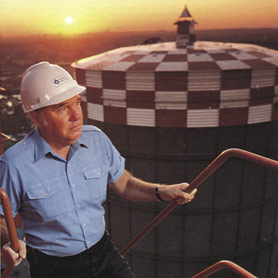Our profile for this issue of the Juniper Berry is a man who, for many years, was an important part of our lives but we weren’t aware of his importance. His name is Al Banke and for 41 years he worked at the Elmhurst Gas Tanks site serving as “The Tank Commander,” a title he received because for seven years he was the Commander of the Glendale American Legion Post 104.
I have to say right here that when I was growing up in Middle Village all the kids had a fear of the Elmhurst gas tanks, I guess you could call it “Tank Terror,” because in the 1940’s they loomed large from practically any site in Middle Village. The fear was always that “they may blow up!” Any time there was a bolt of lightning or a thunder burst in the middle of the night, trust me, my brother, Peter, and I would turn all colors of ashen white as we fled from our bedrooms to comfort each other and wait for the “explosion.” Then, of course, we’d have an argument about who was the bigger sissy! Of course it was Peter, because, first of all, I said, and second, I’m the one writing this article!
Little did we know that later in life a hot shot local guy, Al Banke, who was a little older than us, would come along and ride herd on these massive structures.
Some background on Al Banke tells us that he is a lifelong Maspeth resident who went to the local schools and graduated from Grover Cleveland HS in 1949. He joined the Navy after graduating from high school and at the time had no idea how important the tanks would become in his livelihood when he left the service in 1954.
He applied for a job at the Brooklyn Union Gas Company and when he was hired he brought an enthusiasm to the job that, once recognized by his employers, permitted him to rise up the career ladder and become a field facilities supervisor in 1970. In that role he monitored the hidden streams of natural gas not only in Elmhurst but also at the other stations in Queens and Brooklyn. Also included were the Maspeth Gate Station and the Greenpoint Energy Center.
At these stations the constant below ground flow of methane gas was broken and scattered at reduced force through, what Banke called at the time, “the busiest subterranean passages in America.”
The job of inspecting all five tiers of the tanks was routine for Banke and for internal inspections he used a rowboat.
His job was dangerous too, because he had to navigate along the narrow aboveground catwalk in snowstorms and hurricanes and once, during a lightning storm, a bolt of electricity at the Greenpoint tank jolted him. There was no oversight from OSHA in the “good ole days!”
Al’s responsibility also included removing heavy snowdrifts from the top of the tanks and for that job Brooklyn Union hired employees from other companies who wanted to help and also earn the extra pay.
Al Banke’s professionalism was acknowledged by his employers and he takes pride in the fact that he was the first employee in Brooklyn Union’s history to be given feature treatment with color photos in the company’s annual report in 1984.
At the time the tanks were being removed Al stated that “these tanks have served the people and Brooklyn Union well. I don’t think their removal will have any negative impact on the community. They’ve just outlived their usefulness.” Always recalling my brother’s and my fear of imminent doom from the “terror tanks,” there were no tears from me, we made it, Al Banke saved our lives!
Al Banke was an accomplished baseball player in his early years and later on he became an avid fisherman. His wife of 30 years, Rita, died in 1986. He has many grandchildren who I’m sure bring comfort to him in his retirement years. He currently lives in Greenpoint and tells me that a few times a week he walks the periphery of Juniper Valley Park and loves to watch the boccie players in Juniper.
I should add parenthetically that Al Banke was one of Pete Chahales,’ closest friends. When I talked to Ethel Chahales about the “Maspeth Gay Nineties Parade” Juniper Berry article appearing in the June 2006 issue, she spoke very fondly of Al and the close friendship she still has with him.
It’s guys like Al Banke who had an impact on our lives and it is only later in life that we recognize their contributions. It makes you understand why our neighborhood has endured with such stability and how it will go on as we pass the torch to the newcomers. We thank “Tank Commander,” Al Banke, who had an important job and did it well!



